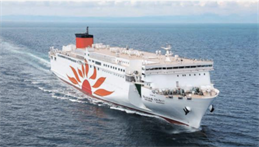
MOL Ferry Co., Ltd. and Ferry Sunflower Limited have merged and started operations as MOL Sunflower Ltd. MOL Sunflower operates 10 ferries and five roll-on/roll-off (RORO) vessels on six routes on land and at sea.
In the announcement, MOL said the merged entity would provide stable services in both logistics and passenger travel with a roughly 30% share of Japan's domestic marine transportation market and the largest route network and number of vessels in operation in Japan.
"The business environment surrounding our business continues to change on a daily basis. In particular, the ferry and coastal RORO vessel industry is facing the '2024 logistics problem', a modal shift in logistics caused by the shortage of truck drivers," Hirotoshi Ushioku, president & CEO of MOL Group Company MOL Sunflower Ltd. "Above all, working toward a decarbonized society is a pressing issue for the ferry and coastal RORO vessel industry."
Ushioku said to respond appropriately to changes in the external environment and customer needs, the "Sunflower" brand must be integrated, and the management base must be stronger than ever before.
"I am pleased to announce that I have been appointed President of MOL Sunflower and Executive Officer of the MOL Group," Ushioku said. "We want to become a ferry and coastal RORO vessel operator that attracts worldwide attention for its business scale, sound management, and the happiness of our executives and employees."
"We will also develop high-quality logistics services to solve social issues such as the '2024 logistics problem'," he added.
In January and April 2023, Japan's first LNG-fueled ferries, the Sunflower Kurenai and Sunflower Murasaki, entered service.
Furthermore, two LNG-fueled ferries are scheduled to enter service between Oarai and Tomakomai in 2025.
MOL said the LNG-fueled vessels will reduce emissions of carbon dioxide (CO2), a greenhouse gas (GHG), by about 25% compared to vessels that run on conventional fuel.
"In the future, we will continually research and consider the adoption of new fuels as an alternative to the LNG an option, and we intend to be the first in the industry to do so proactively," Ushioku said.



